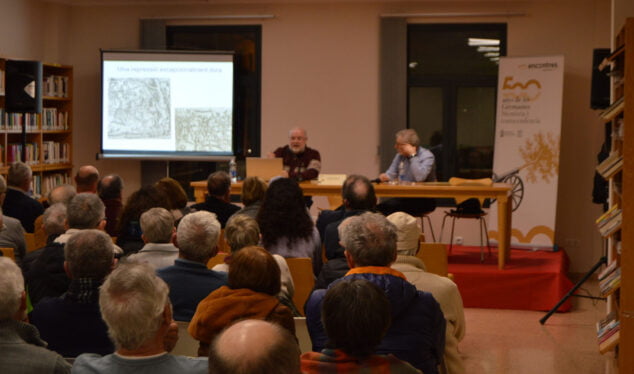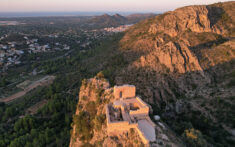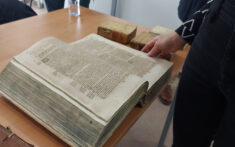The historian and municipal archivist of Ontinyent and Albaida, Vicent Terol, spoke last Thursday at the Encounters in Beniarbeig, dedicated this year to the commemoration of the 500th anniversary of the War of the Germanies. The event was introduced by the writer Beniarbegí, and member of the organizing committee, Tomàs Llopis, who, after reviewing the main milestones of the cycle, thanked the speaker for his participation and highlighted his work as a researcher, especially in terms of local studies, an aspect that has come to change in recent decades the conception that traditional historiography had considered as definitive.
The speaker began by showing the public an engraving full of anachronisms, much to the liking of the romantic conception of the conflict, which served him first to highlight the fact that the germanats They were expressed exclusively in Valencian, and not in Spanish as can be seen from the image displayed, and secondly to distinguish between the historical account and mythification, that is, the distorted vision that can be made of historical events. The Germanía, affirmed the speaker, has been both feared and claimed according to the ideology and the time of the different approaches in the period.
In the first phase of the exhibition, Vicent Terol raised some previous issues, for example he highlighted the fact of life expectancy at that time as one of the factors that can explain the revolt, more than not the concept of ideology, non-existent in the mentality of the protagonists of those events. According to Terol, life expectancy at that time was forty to forty-five years, more or less what the reign of Fernando the Catholic would take, a lifetime for his contemporaries, who threw themselves into the fight out of sheer necessity to survival. He also highlighted Terol, as another of the factors that led to the conflict, the conservative and religious mentality of that society.
When asked what gave rise to the idea of changing things, the speaker responded from various points of view. For him, to speak of "Germanía" is to take into account the relationship of the city of Valencia with the rest of the territory, the "City and Kingdom of Valencia", according to the terminology of the moment. But a more detailed approach in the country reminds us, referring to the Central Regions, that "our city was Xàtiva", as Vicent Terol said verbatim, and recalled on the one hand that a year after the end of the war in Valencia the conflict was still going on in the capital of the Coast, but it is also necessary not to lose sight of the fact that the historical division of the country grants this city a capital status “dellà lo río Júcar”.
Finger from another side, the word "Germany", described by the west as "powerful, inspiring and encouraging", had the virtue of generating a feeling of solidarity that spread everywhere and, in a context of controversy, as it had also the ability to decant in favor of their cause the contemporary explanation of the facts.
The Germanía, for Vicent Terol, was a unique sociopolitical movement and at the same time diverse insofar as it was capable of bringing together various sensibilities and demands in a single cause of struggle. More in detail, Vicent Terol points out the very heterogeneity of the movement as one of the causes of its failure. A social diversity, by high band, that Terol has studied carefully from the point of view of sociology and the changes that take place in human behavior.
The Ontinyent archivist dedicated the second part of his presentation to a few essential aspects, such as the urgent need to go to the sources to clear up the doubts that still exist in the study of the subject, traditionally too devoted to the stories of chroniclers such as Viciana , an author who wrote under the influence of "aid from the coast", a type of salary paid by the victors that forced the author not to always be respectful of historical truth. Teruel announced forthcoming publications, based on the consultation of direct sources, which will come to deny many stories that until now had been considered true.
Finally, the thread of the exhibition was towards the presentation of the facts in the Marines from the three aspects that determine them: an exact knowledge of the territory, of the organization and of the limitations that it entailed; a list of events based on the strategic, military and political importance of the castle of Xàtiva and finally a brief reference to the consequences that arose from that conflict, especially the destruction of Moorish towns, such as Beniarbeig, and the brutal subsequent repression.
The event ended with one of the liveliest and longest colloquiums in living memory. On March 23, Professor Rafael Roca will close the cycle talking about The Germania seen by the writers of the Renaissance.







